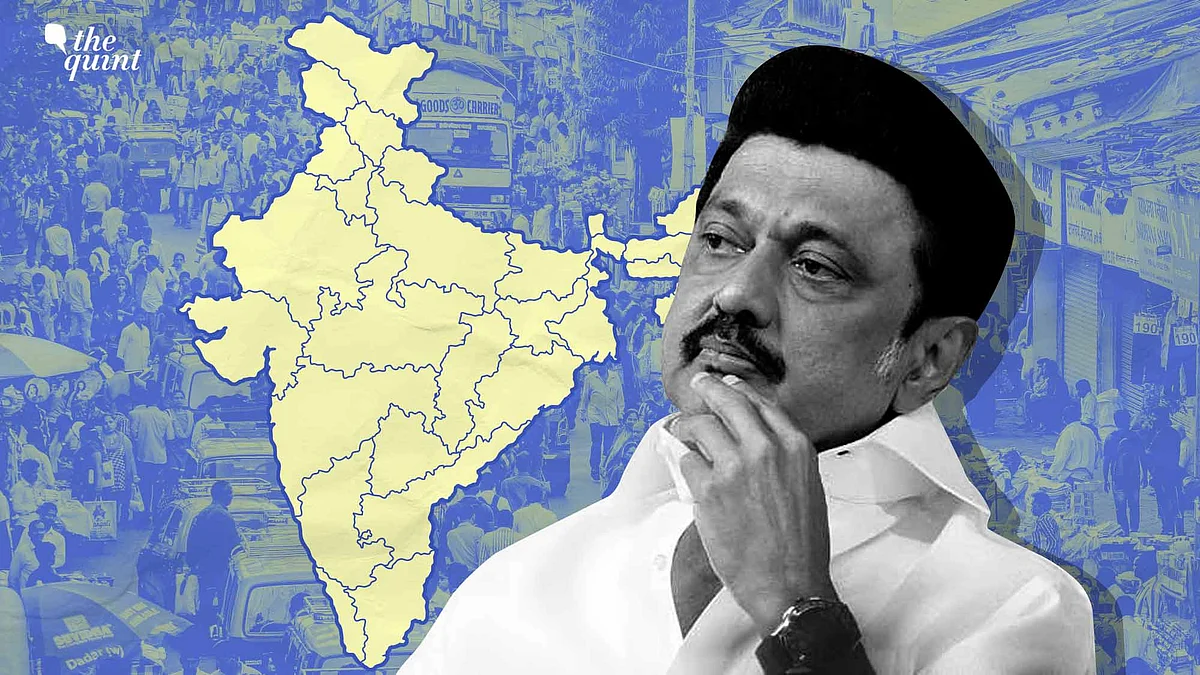
Delimitation Fracas: Why Not Just Break Up the States
India needs to become a union of about 50 states — like the US, write Yashwant Deshmukh and Sutanu Guru.

advertisement
Led by Tamil Nadu Chief Minister M K Stalin of the Dravida Munnetra Kazhagam (DMK), a number of political parties in the southern states of India have raised a metaphorical banner of revolt against the central government over the imminent delimitation exercise.
Their grouse: since delimitation of Lok Sabha and Assembly seats is done on the basis of population, the 2026 delimitation exercise will give “heartland” states like Uttar Pradesh, Bihar, and Madhya Pradesh a disproportionately higher number of seats in the Lok Sabha. Stalin and his supporters argue that this will further emasculate the South in having a say in policymaking — as MPs from the populous northern states will be able to dominate national discussions.
The Delimitation Debate
Before we make an argument on why breaking up states is a sensible solution, let's take a quick look at delimitation itself. It is a constitutional obligation and is based on population figures recorded during the once-in-a-decade Census. Delimitation exercises were held in 1953, 1963, 1973, and 2002. The first three increased the Lok Sabha seats to 543.
In 1976, during Sanjay Gandhi's passionate advocacy for family planning, the Constitution was amended barring any further delimitation until the early 21st century. The ostensible reason was to encourage high population states to adopt effective family planning.
In 2002, another amendment stipulated that the next delimitation will be conducted after 2026, based on the Census conducted after that year. With the 2021 Census indefinitely delayed—likely to take place only in 2026—the number of Lok Sabha seats could increase to nearly 850. If population remains the sole determinant, southern states will plummet significantly.
Meanwhile, heartland states continue to have high fertility and birth rates; apart from being governed poorly, compared to the South. It would be foolhardy to dismiss these concerns by simply saying that some southern states have become habitual “victim card” holders.
Today, Tamil Nadu and Kerala have 39 and 20 Lok Sabha MPs, respectively, while Uttar Pradesh and Bihar have 80 and 40. Under existing rules of delimitation, Tamil Nadu will gain a few seats and reach 44 at best, while Kerala could drop to 18. In contrast, Uttar Pradesh could surge to 125 and Bihar to about 70. No sensible Indian citizen would accept this.
Democracy’s Imperfections: A Global Perspective
That said, all democracies have inherent flaws, no matter what system is adopted. The US, for one, presents an “extreme” example of democracy, where even police chiefs and judges have to contest and win elections.
Similarly, the first-past-the-post system has its own peculiarities.
In 2016, Hillary Clinton won the popular vote, but Donald Trump was elected president due to the electoral college votes. The UK's 2024 general election is another glaring example of the potential dangers of first-past-the-post system. The Labour Party, under Keir Starmer, won just one-third of the vote share, but obtained a massive two-thirds majority.
Likewise, in India, the Bharatiya Janata Party (BJP) won 37 percent of the vote share in 2024 but failed to secure a simple majority. The alternative, proportional representation, is proving to be even more clumsy, as witnessed in several European countries.
Breaking Up Large States: A Radical but Sensible Solution?
Delimitation and caste census work well as political rhetoric, but the real challenge is improving the quality of governance. The authors firmly believe that India needs a “States Break-Up Commission" that will make India a union of about 50 states — like the US.
More important, India's large states do not have a monolithic and homogeneous composition. Cultures, dialects, cuisine and much else vary significantly, as noticed while travelling across India. Even while conducting opinion and exit polls, CVoter and other credible agencies divide states into many different regions. Election results, too, reveal differing voting choices among regions within a single state.
There is recent empirical evidence that supports this argument. Jharkhand, carved out of Bihar in 2000, now has a per capita income double that of Bihar. Chhattisgarh's per capita income is about 15 percent higher than Madhya Pradesh's, while Uttarakhand's is 2.5 times higher than Uttar Pradesh's. Smaller states like Goa, Himachal Pradesh, Haryana, and Punjab all have per capita incomes above the national average.
But with politicians screaming “over my dead body” to the mere suggestion of breaking up states, it begs the question: who will bell the cat?
(The authors work with the CVoter Foundation. This is an opinion piece, and the views expressed are the authors' own. The Quint neither endorses nor is responsible for them.)
- Access to all paywalled content on site
- Ad-free experience across The Quint
- Early previews of our Special Projects
Published: undefined